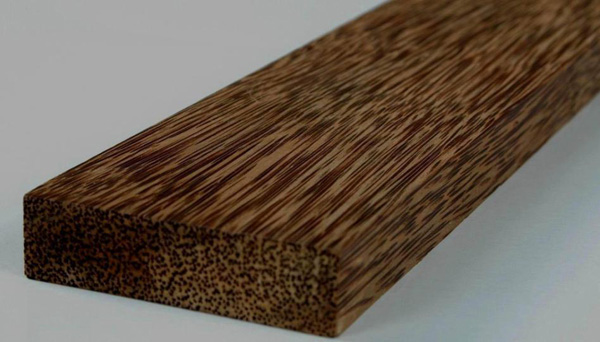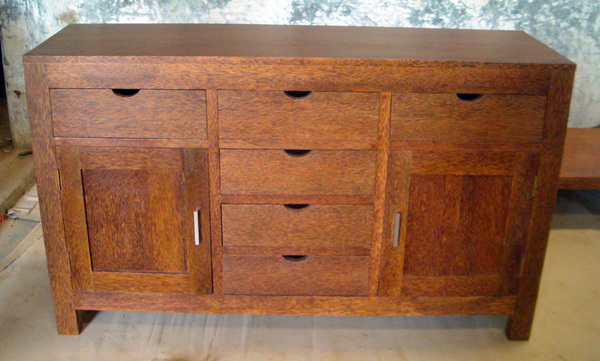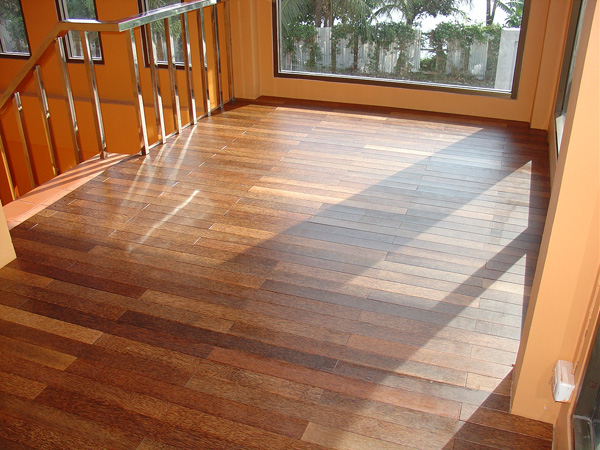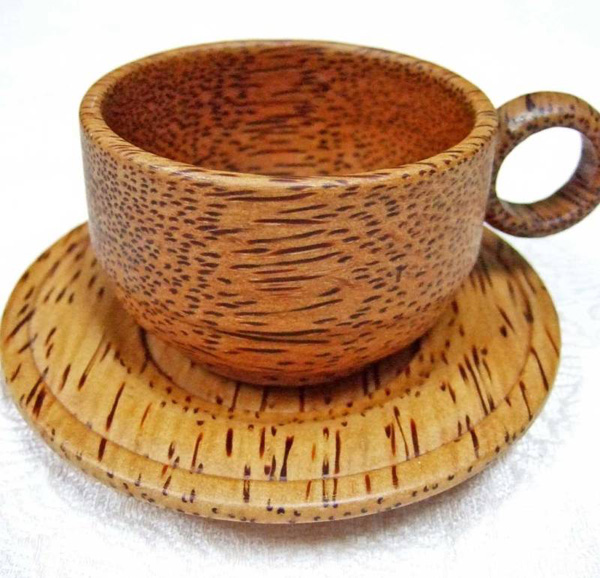
“Coconut timber is a hardwood-substitute from coconut palm trees. It is a new timber resource that comes from plantation crops and offers an alternative to rainforest timber.
Coconut timber comes from farmed plantations of old coconut palms. The coconut palm was planted as a crop in large plantations throughout the tropics in the early half of the 20th century in order to harvest the coconut fruit. The tree bears fruit until approximately 70 years of age, at which point it is considered to have reached the end of its economic life and is felled to make way for future crops. Each year, several million palms are felled throughout the tropics. Traditionally, the trunks have been wasted by-products from this process.
Only in very recent years have people begun to explore the potential commercial uses for this vast, alternative supply of timber. This led to the commercial launch of coconut timber in a range of different products, from flooring to posts to furniture. With these products performing at equal to or even better than conventional hardwoods, coconut timber represents a viable substitute for endangered hardwoods from an ecologically-sound source.
Coconut timber has many applications as both a structural and interior design material. The harder, high-density timber is suitable for general structural purposes such as pillars, trusses, rafting, furniture, window and door frames, floors, decking and floor joists. Medium density coconut timber can be used for walls, ceiling joists and horizontal studs. Low density coconut timber is used in non-load bearing applications like wood paneling, internal trim and ceilings, as well as homewares.”



Source: Wiki
Image source: Tumblr
Image source: Behance.net

We’re a gaggle of volunteers and starting a brand new scheme in our
community. Your web site provided us with useful information to work on. You
have done a formidable job and our entire neighborhood can be grateful to you.
hello, those looking for coco lumber I have coco trees 70 years old and still bearing. I am looking for buyers.
Hi, I am Coconut timber exporter from Sulawesi, Indonesia. you can WhatsApp me or call me at +62 878 3785 7767. Thank you
Bonjour,
Pourriez-vous vous me donner le prix d’un m3 livré en France
Je suis un petit créateur de mobilier et serai très intéressé pour vous représenter en France
Cordialement
Auguste
i am a timber trader and furniture manufacturer .i want to know more about coconut wood .my mobile no is +919414129578 .
It has an affordable price compared to teak, bengkirai, and ironwood.
Has a stable size and is not easy to bend if the finishing process is done properly.
Resistant to attack by termites, powder fleas, rats, and fungi.
The rough wood fibers produce a unique and thick motif with ethnic nuances.
Not easily damaged and scratched by sharp objects.
easy to care for.
Can be processed into various types of furniture, such as cabinets, dining tables, guest chairs, beds, and others.
Coconut trees need be cut into boards before 3 days; after cutting the boards they need to be stacked just like any other wood, with the appropriate spacers so air circulates between the cut boards. The outer part of the trunk is the hardest wood, appropriate for furniture, posts and beams. Usually older, 70 year old trees are cut when they stop yielding coconuts.
The wood after being cut and stacked like any hardwood should have some weight at the top of the stacked drying wood to avoid warping while it dries; it should be under a roof free from water and high humidity or else will it rot.
The wood as you cut further in being softer is not structurally strong and can be used for wall paneling etc. It needs to be dried for close to a year if I remember, if air dried. If drying in kiln to save energy from the kiln you can start by air drying and then cart to the kiln Which cuts drying time significantly. check with your library for more resources or online.
Hi everyone,
i have made a decking outdoor terrace in coconut wood with smooth sanding , but all pores of the timber open again and become rough again,, anyone know about a process to keep the wood smooth? maybe with a sanding sealing?, wax?
thank you
Hello & Good Day !
How much would a 50 year of age Coconut tree cost ? Or what is the market value ?
How much would be a 75 year old Coconut palm tree ?
Also how much is a 35 year old tree ?
Thank You,
Nihal
You might query the folks at https://www.bellforestproducts.com about this.
WhatsApp me for details
91 8304034884
Our coconut trees more than 100 in numbers, fell due to the recent storm. Their age is 30 years and some are 15 years. Can we use it for interior design works ? If so, how to preserve them ? Thanks in advance for your reply.
I have never worked with coconut wood, but it appears that it should work fine for interior construction. Preservation would be similar to other woods, by carefully drying the wood, and then applying a natural finish coat like boiled linseed oil for any wood that is to be exposed.
We will use our own 100 years old coconut tress for our
House, floors, kitchen top and other. Do you we need to apply any anti woodworm and dry it before we use the coconut wood.
Please advise what to do.
Thanks
Luz
I would assume that, like any hardwood, you should dry it before using and use standard cautions to avoid pests or rot.
Cut correctly cocowod is not long grained a so blades try to wobble; you a need good carbide tipped preferably. Don’t cut all trees… Try to cut the boards as you stack them with spacers for drying several months depending if you use blowers to circulate air and the average moisture content in your area. Do not leave a trunk more than 3 days outside because it starts degrading; cut as much you are able to stack inside roofed open structure free of rain and windblown water which will damage the wood. about cutting the wood check websites from New Zealand or Thailand or Indian agricultural services so you cut correctly to maximize outer hard wood which you will need for posts beams or trusses lighter wood from boards inside can be used for paneling or doors or non structure applications. I have never done this but started reading and want find plantation in Philippines or India interested to allow me cut the trees and commercialize so I can sell the wood. The outer hardwood is very hard but limited because after few inches it starts becoming softer there are guidlines and charts available how to cut on agriculture extension services of Thailand India Philippines. I believe outer hard wood could be used even for small boats once dried thoroughly and painted like any other wood with special marine paints and using water proof sealants and glues. As mentioned I’m starting to read about this. Consult coconut producing countries Thailand I suspect is large producer; all coconut water seems come from there.
hi there could u tell me can u use the whole trunk as a timber or is it the first 4 mtrs ect the best to mill
cheers
I don’t know. I’ve never worked with coconut wood. I mostly see it used for craft projects.
when you will use coconut wood as timber quality like Flooring or funiture, you cannot use whole trunk. utilization of coconut as timber is depend on the age and how length of it. it may 3-4 mtrs for everage 30 years old.
meanwhile the oldest one is up to 75 years old will use first 12 mtrs. hope will answer your question. thnks
I want to use coconut timber to build a skiff. Anyone know if this has been done?
It’s best to use strong, water resistant wood.
are there any other ways to preserve coconut wood other than CCA? Also, how long must a tree dry out before milling it? Please advise
The standard drying process for wood is to mill it over size, sticker it to allow adequate ventilation, and then keep protected from the elements so it can dry slowly. Companies often speed up the process with equipment and additional processes.
Not sure how to preserve coconut wood. You may want to research this through a university library.
I’m interested in buying coconut wood. Where would I purchase it. I want to build a table. 45x55ish.
Search online. Specialty lumber companies that cater to hobby woodworkers may carry it.
Excellent source of information. Thank you!!!!
Looking for boards to build a custom piece of furniture.
It may be hard to find because it’s not a standard commercially available wood. You might have to get it custom milled or go through a specialty wood supplier.
Aloha,
I really like the coconut cups and utensils.Do you wholesale? If so how do I get a wholesale price list. I have a wood Gallery in Hawaii and used to carry a line of the coconut spoons etc. Mahalo, Jeanette McLaren
Aloha,
What’s your website? I too am looking for coconut wood for a small sign.